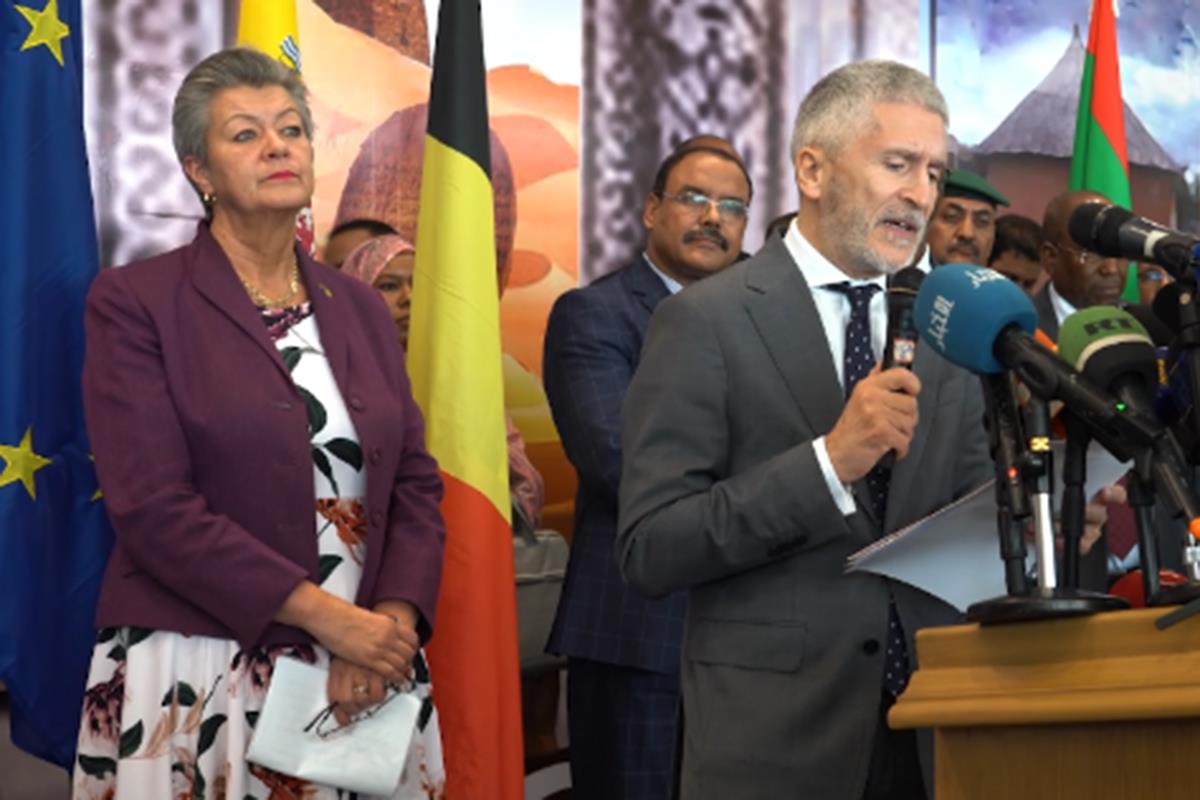Grande-Marlaska highlights Mauritania as a "priority strategic partner" for Spain and the European Union in migratory co-operation
News - 2024.3.7
 The Minister for Home Affairs, Fernando Grande-Marlaska, together with the European Commissioner for Home Affairs, Ylva Johansson, in Nouakchott (Mauritania)
The Minister for Home Affairs, Fernando Grande-Marlaska, together with the European Commissioner for Home Affairs, Ylva Johansson, in Nouakchott (Mauritania)
The Minister for Home Affairs, Fernando Grande-Marlaska, has described Mauritania as a "priority strategic partner" in migratory matters and has referred to the work carried out by Spain in the country for the last 15 years as "one of the most effective examples of bilateral operational cooperation" between Europe and Africa.
Grande-Marlaska made these remarks during his visit to Nouakchott, where he travelled with the European Commissioner for Home Affairs, Ylva Johansson, and the Belgian Secretary of State for Asylum and Migration, Nicole de Moor, in her capacity as representative of the Belgian presidency of the Council of the EU, to sign the joint partnership on migration between the European Union and Mauritania, initialled by Commissioner Johansson.
The European delegation held meetings in the capital with the President of Mauritania, Mohamed Ould Ghazouani, at the Presidential Palace, and with the Ministers for Home Affairs and Decentralisation, Mohamed Ahmed Mohamed Lemine, and Economy and Sustainable Development, Abdessalam Mohamed Saleh, at the Palais des Congrès.
The minister highlighted this declaration as "clear evidence of the commitment and essential common interests" between the EU-27 and Mauritania. "The fight against irregular immigration, terrorism and organised crime are not only bilateral challenges, but also a common responsibility between Mauritania, the EU and all its member states", he added during his speech.
Thursday's trip is the second one made by the minister with the European Commissioner, after the visit in September 2020, and comes after another meeting that took place in Nouakchott last October, accompanied by the Vice-President of the European Commission, Margaritis Schinas.
The European Union also launched the EU-Mauritania Migration Dialogue in 2023, which held its first meeting in Brussels on 11 December. Subsequently, on 8 February, the President of the Government of Spain, Pedro Sánchez, and the President of the European Commission, Ursula von der Leyen, met with President Mohamed Ould Ghazouani in Nouakchott.
Joint Partnership on Migration
The Joint Declaration between the EU and Mauritania signed on Thursday aims to strengthen cooperation with Mauritania to tackle the causes that affect migratory flows, boosting economic cooperation and pursuing human trafficking mafias, among other objectives.
The partnership represents support from the EU and its member states for the bilateral migratory cooperation that Spain has maintained for twenty years with Mauritania, in a context of increasing irregular arrivals through the Atlantic route, which is particularly dangerous for migrants.
The agreement sets out a roadmap with five key priorities: socio-economic opportunities for youths to facilitate social cohesion; protection and asylum; legal migration and mobility; irregular migration, smuggling, trafficking, return and readmission; and border management, surveillance and control.
Joint operational cooperation
Spain maintains close police cooperation with Mauritania, with around fifty National Police and Guardia Civil personnel deployed in the country, who work with local police forces in air and land maritime patrols and in the investigation and dismantling of human smuggling and trafficking mafias. This includes the deployment of two vessels, a helicopter and 14 all-terrain vehicles, as well as a surveillance aircraft and an ocean-going vessel at certain times.
The Guardia Civil also participates in the GARSI-Sahel European cooperation programme, together with the security forces of France, Italy and Portugal. Phases I and II, which ran from 2017 to 2023, facilitated the creation of two Mauritanian national gendarmerie units, each with 140 personnel. Phase III, which aims to create a third unit on the border between Mauritania, Senegal and Mali, and which will have a river component, is currently being promoted.
Non official translation




